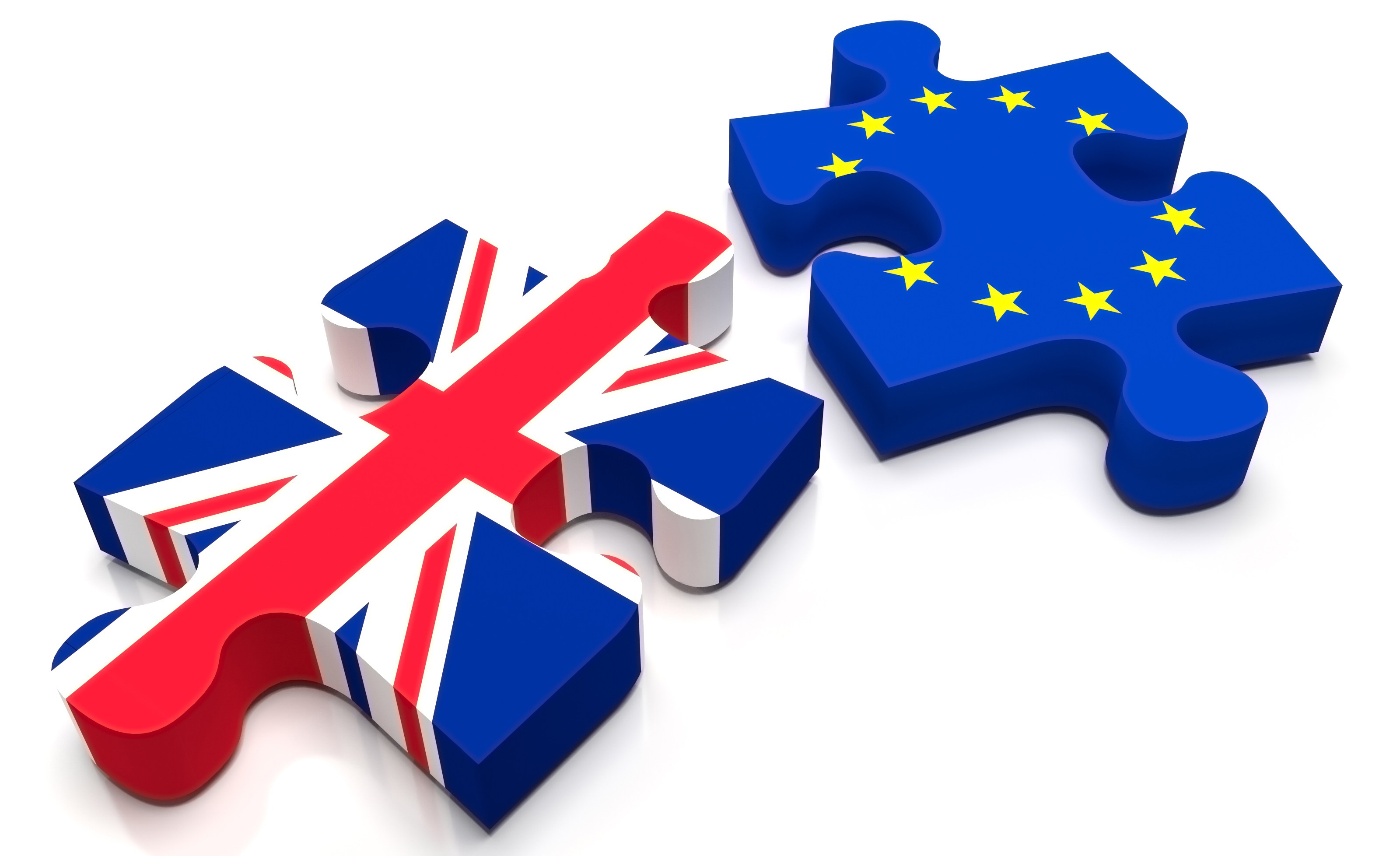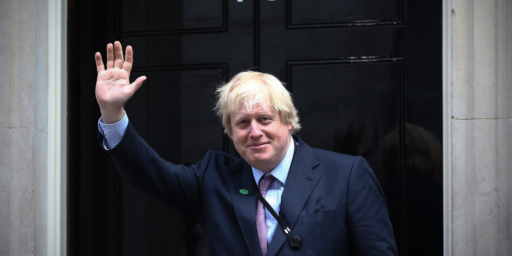Bregrets, They’ve Had A Few
A new poll shows that a majority of the British public believes that the Brexit referendum was a bad idea. What that means for the future of Brexit is not at all clear.

As the United Kingdom rushes toward yet another Brexit deadline that many in London are already talking about punting on again, a new poll shows a majority of Brits regret the decision the leave the European Union and think the initial Brexit referendum was a bad idea:
Among Labour voters, 72 percent think the referendum should never have been held, while only 18 percent said it was the right thing to have done.
The poll also shows Nigel Farage’s new Euroskeptic Brexit Party performing well among Brits. In a national vote, the Brexit Party polls third with 17 percent of the vote, behind Labour on 33 percent and the Conservatives on 26 percent.
For the European Parliament election, the poll puts the Brexit Party joint first with the Labour Party, both with 28 percent of the vote, and double the level of support for the Conservatives (14 percent). The pro-Remain Change UK would receive just 7 percent of votes, according to the poll.
POLITICO’s aggregate of national polls for the European Parliament election puts the Labour Party at 26.2 percent of the votes followed by the Brexit Party on 18.6 percent.
More from The Guardian:
More than half the public – 55% – now think it would have been better never to have held the EU referendum given the difficulties of reaching an agreement on Brexit, according to the latest Opinium/Observer poll.
Strikingly, more Conservative voters (49%) now think the referendum was a bad idea than believe it was the right thing to have done (43%).
Among Labour supporters, 72% believe it would have been better never to have staged the vote, while 18% say it was worthwhile.
The Conservatives are down 3 percentage points on 26% compared with a fortnight ago and continue to trail Labour (also down 3pts on 33%) by seven percentage points. Nigel Farage’s newly formed Brexit party, meanwhile, has established itself in a clear third place on 17%, having been included in the national poll for the first time.
The Liberal Democrats are down 2 points on 6%, the SNP unchanged on 5%, Ukip down 7 on 4%, the Greens unchanged on 4%, Change.UK (also included for the first time) is on 4% and Plaid Cymru is unchanged on 1%.
When voters were asked how they intended to vote in the European elections, the news was even better for the Brexit party.
Support for Nigel Farage’s new party and Labour stands level at 28% – double that for the Conservatives, on 14%. The pro-remain Liberal Democrats and ChangeUK parties both stand on 7%, while the Greens are on 6%, the SNP 5%, Ukip 3% and Plaid Cymru 1%.
If a second referendum were held between the options of leaving the EU on the prime minister’s deal or remaining in the EU, 46% say they would vote to remain (unchanged on a fortnight ago) while 34% would vote to leave (down 4%).
Nearly half of those polled thought Theresa May should resign either once the withdrawal agreement has been passed or sooner, with only 14% believing she should continue as prime minister and lead the second phase of the Brexit negotiations before resigning.
This isn’t the first time we’ve seen signs that the British public was having second thoughts about leaving the European Union. As I noted in both October 2017 and February 2018, there was polling indicating that the British people were beginning to have second thoughts about Brexit and that there was building support for a second referendum, an idea which continues to be mentioned by Brexit supporters and opponents to this very day.
What all this means is hard to say, but for the moment at least it is unlikely to impact either the ongoing Brexit negotiations or the inevitability of the United Kingdom’s exit from the European Union. Both the British government and the European Union have made clear that once the United Kingdom pulled the trigger on formally withdrawing from the European Union that there would be no walking away from the process and that it really wouldn’t be possible for Britain to take back its decision to leave the Union. That process began on March 29th when Prime Minister Thersa May invoked the provisions of Article 50 of the European Union treaty. At that point, the two-year clock started ticking and, at least for now, the formalization of the exit was to have been completed by March 29th, 2019. That date, of course, has been postponed. Originally that new deadline was supposed to have been roughly two weeks ago, but it has since been punted even further down the road to October 31st. It’s still unclear what the terms of that exit will look like, and there have been several months of political turmoil in London as Prime Minister May tries to come up with a deal that her own party will accept, which is proving to be exceedingly difficult. Additionally, there really isn’t any mechanism in British law for the decision to be reversed even it if were possible under the treaty. The law that authorized the government to go ahead with the referendum doesn’t contemplate any kind of a second vote that would attempt to reaffirm or overturn the results of the vote, and as previous polling has noted the British public seems to accept the reality that Brexit will happen regardless of what the terms of the final agreement or what the consequences for the United Kingdom might end up being.
At the same time, though, these polls do seem to reflect the fact that the reality of Brexit is starting to hit home with British voters and that, at least to some extent, the thought is starting to take hold that perhaps the decision to leave may have been just a bit hasty, or that there should have been some further consideration of the matter beyond the referendum that took place in June 2016 and resulted in a relatively slim majority choosing to leave the E.U. in a vote that brought roughly 72% of the U.K.’s registered voters to the polls. In the end, the margin in favor of leaving was just under 1.3 million votes, which was just about 2.7% of the total amount of people who voted and 1.9% of the total population of the United Kingdom. As I noted in the wake of the Brexit referendum itself, that leads to the question of why the vote authorizing the referendum didn’t require some form of supermajority in favor of leaving given the consequences that the decision would quite obviously have for the U.K. in the future. Those issues are in the past, of course, but these poll numbers do seem to indicate that at least some portion of the British public is beginning to think that the decision to leave the E.U. deserved more consideration than it actually received.
Of equal interest in this poll is what it has to say about the current state of British politics and the potential outcome of a hypothetical General Election. The fact that the conservatives are currently sitting in second place behind a Labour Party that continues to be mired in controversy due to the leadership of Jeremy Corbyn and with the new pro-Brexit party founded by Nigel Farage, who previously led the United Kingdom Independence Party (UKIP), on their heels raises real questions about the political future of the Tories in general and the government of Theresa May specifically, who many observers do not expect to survive long after the Brexit saga is over even if the Conservatives manage to hold on to power. With respect to the upcoming elections to the European Parliament, the Brexit Party actually leads the Tories, which is odd only because it’s hard to understand why a party in favor of leaving the E.U. is even interested in running in elections for a government it opposes. With respect to the general election at least, though, it is worth noting that the Conservatives will not be required to call for a General Election until May 2022 at the latest so it’s possible they’ll be able to survive the current tumult, Additionally, since it seems likely that the Brexit situation will be resolved one way or the other well before 2022, Farage’s single issue party, which seems to consist largely of pro-Brexit Tories frustrated with May, likely won’t last very long.
All that being said, with the path to Brexit no clearer than it was a month ago, the fact that the British public seems to be coming to regret their decision could end up playing an important role in how things proceed. If more Brits come to believe that Brexit was a foolish idea to begin with and that the costs of leaving the E.U. far outweigh any benefits then the pressure on May, Corbyn, and others could increase. Whether that would be enough to stop a process that many consider inevitable at this point, ,though is unclear.





Doug: “Additionally, there really isn’t any mechanism in British law for the decision to be reversed even it if were possible under the treaty. “
The ECJ (?) said that the article 50 notice can be withdrawn.
“The law that authorized the government to go ahead with the referendum doesn’t contemplate any kind of a second vote that would attempt to reaffirm or overturn the results of the vote, “
Parliament (theoretically) can simply pass another law, authorizing a second referendum. Please remember that the first referendum was non-binding, *and* that no Parliament can bind another (which, BTW, will be a big problem for all of these trade treaties that the UK is supposed to negotiate).
“…and as noted above the British public seems to accept the reality that Brexit will happen regardless of what the terms of the final agreement or what the consequences for the United Kingdom might end up being.”
I’m sorry, perhaps I skimmed too lightly, but where above is that noted?
The first long quote has Labour at 33%, Tories at 26% and Brexit at 17%, this is polling on a national election.
Later it says that on a vote for the EU, we have Labour and Brexit both at 28% and the Conservative party at 14%.
Granted that these aren’t for the same election – national vs. EU – but that’s really kind of weird. It seems like a lot of Tory voters crossed over to Brexit for the EU election. Which probably means it’s a protest “vote” expressed to a pollster.
It’s not so much the leaving of the EU that they’re having second thoughts about–this is a scream of rage at the incompetence of the government at carrying Brexit out. (“Why haven’t we left yet?!”)
The funny thing is, the other side (a.k.a. the non-U.K. EU) has become more and more fed up with the U.K. and it’s quite likely that they’re going to kick the U.K. out when the October deadline rolls around, no matter what the U.K. decides.
At present, it’s all devolved back into U.K. politics, the fury of the grassroots at the Establishment Tories, the dread that Corbyn will get in, the expected loss of up to 800 seats by the Tories, and the rise of Farage and his merry men running for seats in the unwanted E.U. elections. Oh, and how in spite of everyone’s rage against Theresa May she has managed to remain in place because the alternative politicians are considered so horrible….
@Barry:
I am talking about current law in the UK which doesn’t allow for a second referendum. Sure, Parliament can pass a law providing for one but they don’t currently seem inclined to do so.
With respect to the rest I have edited the post to clarify my point.
@Doug Mataconis: Doug, I believe that you should have been more clear. After all, the law didn’t provide for Brexit until Parliament passed the official Article 50 notice.
Brexit has impacted something I’m doing in a small but significant way and I thought it might be worth sharing. A company I advise acquired a small British company (~ 30 people), a strategic purchase that helps them consolidate a particular market segment. Bottom line, they need the products and would like to retain the expertise, but have to weigh that against the time and expense of keeping a separate entity up and running. They asked me to a) make the best arguments possible for keeping them going and b) if the outcome of a is insufficient, advise on how best to transfer that expertise to another location where they have more people. One thing that came to mind for the “Keep” column was that the EU is undergoing a big shift in their regulatory regimes and having a small regulatory group that can hop on a plane or train to attend meetings, meet with officials and so forth is an argument in keeping that group there. But I can’t put that down without adding a big caveat: They are only useful if Britain maintains the same regulatory regime as the EU (for these types of products) and that their membership and acceptance as Brits will continue to grant them access to the regulators and enforcers. And remember, one of the primary reasons Brexiters wanted to leave was to cast off burdensome European regulations. I think the most likely outcome is that Britain will stay as signatories to the agreements and norms covering these products regardless of Brexit, but we won’t know that for a year or more. The decision has to be made sooner than that, so that can only go in the “tentative plus” category. And, to be honest, I might end up recommending they add some people in a larger German group they have to address the issue.
Now, this reason alone wouldn’t be sufficient to keep the site operational, and there are other technical reasons that may be more important, but it was interesting to me how it played out even on something at this small scale.
@grumpy realist: “It’s not so much the leaving of the EU that they’re having second thoughts about–this is a scream of rage at the incompetence of the government at carrying Brexit out. (“Why haven’t we left yet?!”)”
I think that some are like that, but others are realizing the implications of even a soft Brexit. IMHO, the only question is hard recession (negotiated deal) or hard crash (no Deal).
It’s like somebody has talked you into ‘leaving your job’, and you are now realizing what that means.
Hindsight is 20/20 and all, but wasn’t it clear to anyone in the Cameron government, that a simple remain/leave option wasn’t good enough if “leave” were to win?
That is, suppose the option had been remain vs a detailed list of terms for leaving, or even a range of terms for leaving, that would have been a realistic choice, and an informed one. As it was, you had current conditions vs pie in the sky.
I suppose it was assumed “remain” would win easily, so why bother making things complicated?
Reagan said government is the problem, but Rs keep putting up candidates for essentially every slot.
@Barry: Particularly as the economic impact of “leave” becomes ever more apparent ( the cost of leaving & preparing to leave is ~£450-800 million/week, depending on whose estimate you’re following, which more than wipes out all the promised “savings”). What’s odd to me, and remains odd, is May’s obstinate insistence on “leave” (without a plan, moreover – she could have spent the past two years coming up with an actual plan and then invoked Art. 50, for instance) and refusal to even talk to Labour.
I understand that her pigheadedness may be a characteristic of hers, but given Russian interference in the Brexit campaign, it’s hard not to see some covert influence being exerted here.
Also, Doug – kudos on the post title. I laughed out loud. Now I have “My Way” stuck in my head.
@grumpy realist: I can definitely see that this has been handled incompetently by May. But was there a solution available that could have satisfied the Hard Brexiters (who seem to have campaigned with a Trumpian relationship to the truth) and the remainers? Competence may have helped on the fringes but I don’t see it as a game changer here.
I think you are right about what this survey means. Certainly the voting public across the western hemisphere no longer seems to be capable of realizing that they voted for something that was never going to happen, instead blaming the government for their own mistakes.
@Pete S: There was never a solution available once the Leave contingent decided they didn’t have to come up with an actual plan and could promise everything to everyone during the campaign. They wanted a “Yes, we’ll leave” result, then planned to dump the actual problem of how to do it in the government’s lap and run for the hills. Add to that Theresa May’s nest of red lines and you’ll quickly realise that the intersection of all the possible solutions is in fact a null set.
Now of course the hard right Leavers have decided to run away from the problem by whining how MEEEAN the E.U. is for not giving them everything they’ve demanded. They want the fisheries back–in spite of the fact that a sizeable number of U.K. fishermen have already sold their quotas over the years. They want “no tariffs”–in spite of the fact that they don’t want to participate in a customs union. And they don’t want to have to deal with any E.U. regulations–in spite of the fact that they want access to frictionless trade. Oh, and they don’t want a border with Ireland–in spite of the fact that they claim they want to control the U.K. border. (Their suggested solution is that Ireland get out of the E.U. as well, in spite of the fact that Irish approval of sticking with the E.U. is something like 82%).
Talk about a nation of spoiled brats…..
@grumpy realist: And they still might lose Scotland.
@Mikey: I think the latest poll in Scotland was showing 49% in favor of Scotland leaving the U.K.
Given the deliberate lack of planning by the Brexiters, I think it would be jolly good karma if the Scots decided to leave the U.K. and stick with the E.U. and if NI would join the ROI.
@Grumpy realist:
Unfortunately for Scotland, they can’t leave the EU, after Brexit and stay in the UK. They would need to apply as a nation that meets EU membership qualifications and Scotland probably doesn’t.
Northern Ireland can leave the UK and stay in the EU if it were to merge with the Republic of Ireland. Now if Scotland were to join the Irish Republic in a United Celtic Alliance that would be an interesting question.
@Sleeping Dog: I think that their second-biggest obstacle will be the extreme reluctance of the EU leadership to even look like they are encouraging a break-away province.
Their biggest obstacle will, of course, be the ‘leave’ faction in the Tory Party 🙁